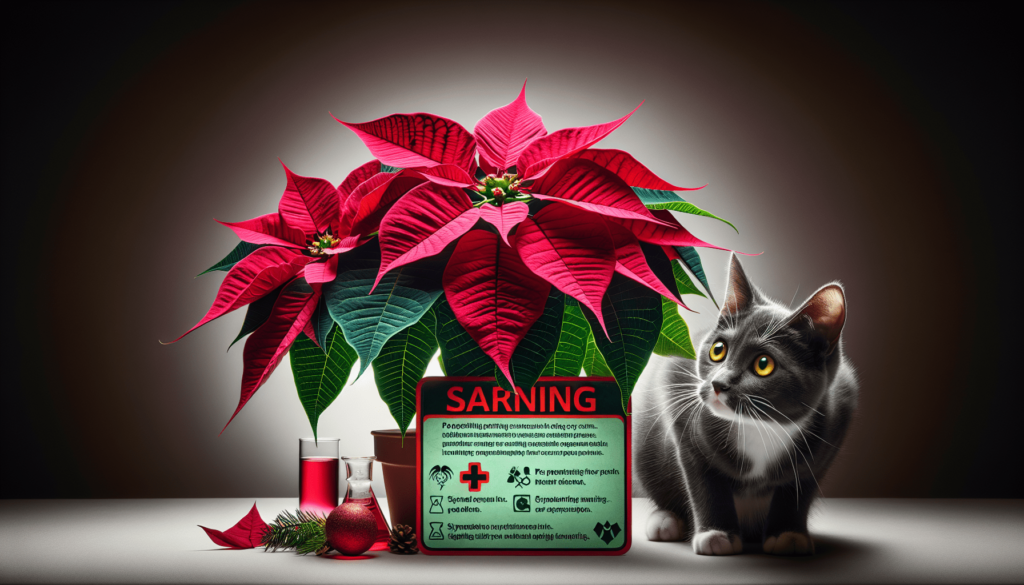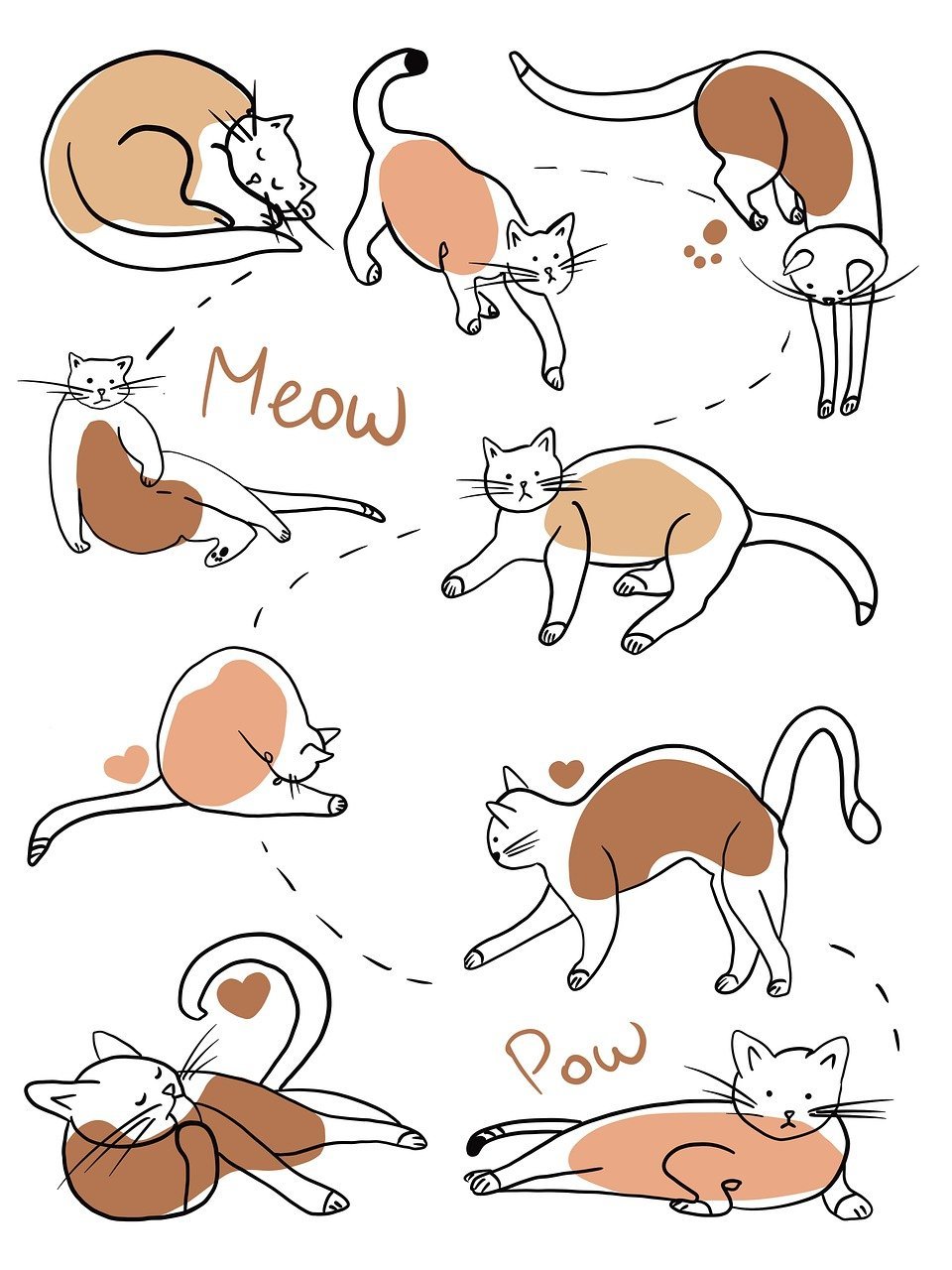Did you know that the beautiful poinsettia plants we often see during the holiday season may pose a potential danger to our feline friends? Although widely believed to be highly toxic, there’s more to the story than meets the eye. While it’s true that poinsettias can cause mild gastrointestinal discomfort if ingested, the level of toxicity is generally low, and severe poisoning is rare. Nevertheless, it’s essential to take certain precautions to ensure your cat’s safety and well-being. Let’s explore the facts about poinsettias and their potential effect on our beloved cats.
Understanding Poinsettias
What are Poinsettias?
Poinsettias, scientifically known as Euphorbia pulcherrima, are vibrant and festive plants that are commonly associated with the winter holiday season. These plants are native to Central America and thrive in warm climates. Poinsettias are characterized by their beautiful red, white, or pink bracts, which are often mistaken for flowers. The actual flowers of a poinsettia are small and yellow, located at the center of the colorful bracts. Poinsettias are popular as decorative plants and are commonly used in holiday flower arrangements, as well as in indoor and outdoor decorations.
Origins of Poinsettias
The history of poinsettias dates back to the ancient Aztec civilization. It is believed that the Aztecs referred to the plant as “Cuetlaxochitl” and highly valued its vibrant red color. Legends also suggest that poinsettias were associated with a beautiful myth involving a young girl who didn’t have a gift to offer the baby Jesus during a Christmas procession. As she knelt down in prayer, a miracle occurred, and bright red flowers sprouted from the ground. This miracle was interpreted as a sign of purity and faith, leading to the association of poinsettias with Christmas.
Common Uses of Poinsettias
Poinsettias have become synonymous with the holiday season and are extensively used for decorative purposes. They are often arranged as centerpieces on dining tables or placed near the fireplace to add a festive touch to the surroundings. Poinsettias are also used in wreaths, garlands, and as potted plants for indoor and outdoor decorations. Additionally, these plants are frequently gifted to friends and loved ones during the holiday season, spreading joy and festive cheer.
Poinsettias and Cats: A Common Misconception
Myths about Poinsettias Being Deadly to Cats
There is a common misconception that poinsettias are highly toxic and can be deadly to cats if ingested. However, this is merely a myth that has been perpetuated over the years. Poinsettias have been falsely accused of being highly poisonous to cats, causing severe illness or even death. Fortunately, this myth has been debunked by scientific research and studies conducted on poinsettias and their potential toxicity to cats.
Where the Misconceptions Originated
The origins of the poinsettia and cat toxicity misconception can be traced back to a single incident in 1919. A child from Hawaii was claimed to have died from consuming a poinsettia leaf, leading to public panic and the subsequent spread of misinformation. Despite no conclusive evidence linking the poinsettia to the child’s death, the myth gained traction and became widely believed. Over time, the misconception grew, causing unnecessary fear among cat owners during the holiday season.
Popularity of the Myths
Despite numerous scientific studies refuting the toxicity of poinsettias to cats, the myths surrounding their danger remain prevalent. The spread of information through word of mouth, social media, and online forums has contributed to the perpetuation of these myths. It is essential to separate fact from fiction and rely on accurate information to ensure the well-being of our feline companions.

Are Poinsettias Poisonous to Cats?
Toxicity Levels of Poinsettias to Cats
Scientific research has determined that poinsettias possess relatively low toxicity levels, particularly towards cats. Ingestion of poinsettia leaves or bracts may cause mild discomfort or gastrointestinal upset in cats but is rarely life-threatening. The sap of the poinsettia plant contains chemicals known as diterpenoid euphorbol esters, which can cause irritation to the mucous membranes and gastrointestinal tract. However, the concentration of these chemicals in poinsettias is generally too low to cause significant harm to cats.
Scientific Evidence Supporting the Toxicity
Various studies have been conducted to assess the toxicity of poinsettias to cats, and the results consistently support their low toxicity levels. The American Society for the Prevention of Cruelty to Animals (ASPCA) has classified poinsettias as mildly toxic to cats. Their statistics show that, in most cases, any potential discomfort experienced by cats after ingesting poinsettias is often mild and self-limiting. It is important to note that while poinsettias may cause minor digestive upset in cats, severe poisoning or fatal outcomes are extremely rare.
Signs of Poinsettia Ingestion in Cats
Physical Symptoms in Cats
If a cat has ingested poinsettias, certain physical symptoms may manifest. These symptoms are generally mild and temporary in nature, typically resolving on their own within a short period of time. Some common physical signs of poinsettia ingestion in cats may include mild gastrointestinal disturbances such as vomiting or diarrhea. It is important to monitor these symptoms closely and seek veterinary attention if they persist or worsen.
Behavioral Changes in Cats
In addition to physical symptoms, poinsettia ingestion might lead to some behavioral changes in cats. These can include increased restlessness, excessive grooming, or decreased appetite. It is essential to pay attention to behavioral changes as they can provide valuable insights into the well-being of our feline friends. If any abnormal behaviors are observed following poinsettia ingestion, it is advisable to consult a veterinarian for further guidance.
Duration of Symptoms Post-Ingestion
The duration of symptoms experienced by a cat post-ingestion of poinsettias can vary. In most cases, the symptoms are self-limiting and subside within a few hours to a couple of days. However, it is crucial to monitor the cat closely and seek veterinary advice if the symptoms persist or worsen. Timely intervention can help ensure the swift recovery of the cat and provide peace of mind for the owner.
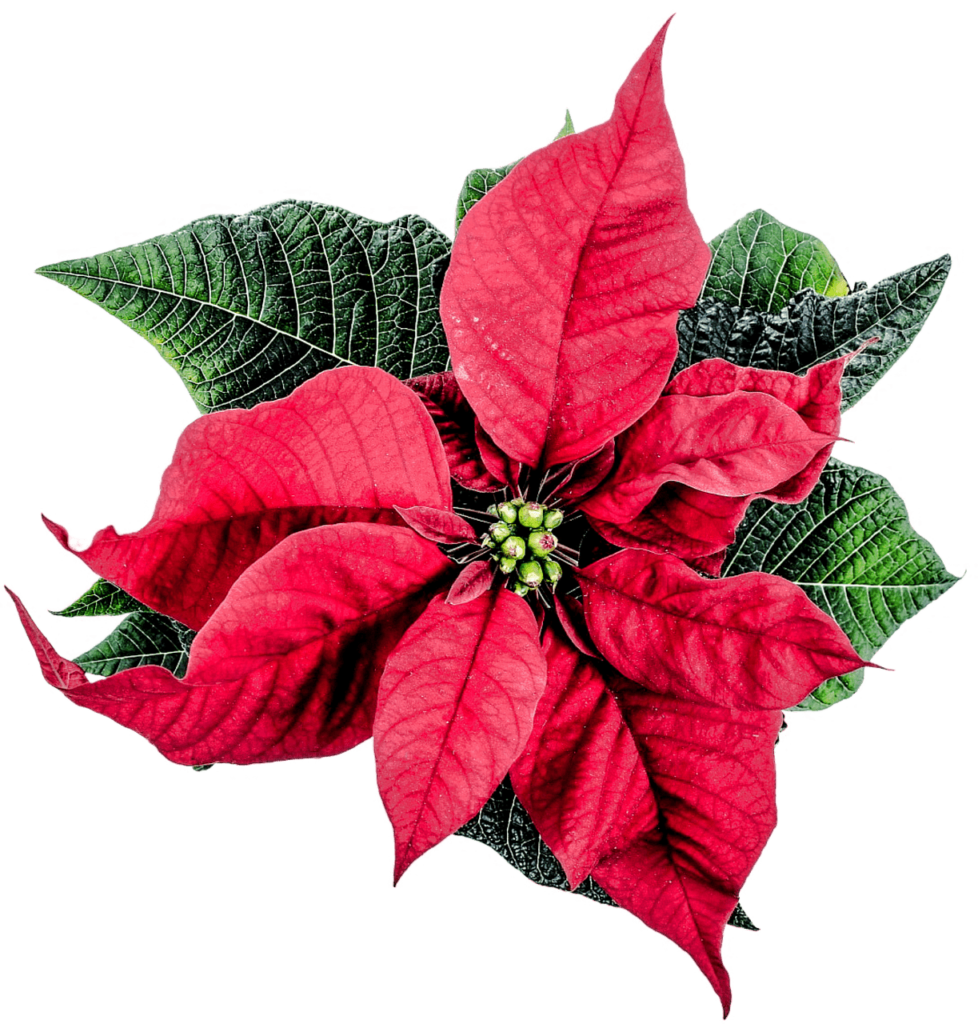
Treatment Procedures for Cats
Immediate Steps After Ingestion
If you suspect that your cat has ingested poinsettias, it is important to take immediate action. Begin by removing any remaining plant material from the cat’s mouth to minimize further ingestion. Offer your cat fresh water to drink, which can help dilute any potential toxins. Monitor your cat closely for any signs of distress or discomfort and contact a veterinarian for further guidance and advice.
When to Visit the Veterinarian
While poinsettia ingestion is generally mild and self-limiting, there are instances where veterinary intervention may be necessary. If your cat experiences severe or persistent symptoms such as excessive vomiting, diarrhea, or signs of distress, it is advisable to seek immediate veterinary care. Additionally, if you are uncertain about the exact cause of your cat’s symptoms or have any concerns, a visit to the veterinarian can help provide a thorough examination and appropriate treatment.
Treatment Options Available
The treatment options for cats that have ingested poinsettias primarily focus on managing symptoms and preventing any potential complications. In mild cases, the veterinarian may advise monitoring at home, providing supportive care such as fluids to prevent dehydration, and adjusting the cat’s diet as needed. In more severe cases, additional interventions may be necessary, including anti-emetics to control vomiting or medications to manage gastrointestinal discomfort. The specific treatment plan will depend on the severity of the symptoms and the veterinarian’s assessment.
Preventing Cats from Ingesting Poinsettias
Tips to Keep Poinsettias Out of Cats’ Reach
Prevention is key when it comes to protecting cats from poinsettia ingestion. Here are some helpful tips to keep poinsettias out of your cat’s reach:
-
Choose safe locations: Place poinsettias in areas where your cat cannot access them, such as high shelves or hanging baskets.
-
Create barriers: Use baby gates or temporary fencing to keep cats out of certain rooms or areas where poinsettias are displayed.
-
Supervise interactions: If you have a curious cat, consider keeping a close eye on them whenever they are near poinsettias.
-
Opt for artificial plants: If you are concerned about your cat’s safety, consider using artificial poinsettias instead of real ones.
Alternative Plants Safer for Cats
If you prefer to have live plants in your home and want to avoid any potential risks associated with poinsettias, several cat-safe alternatives can still create a festive atmosphere. Some examples of cat-friendly plants include:
- Christmas Cactus (Schlumbergera spp.)
- Spider Plant (Chlorophytum comosum)
- Areca Palm (Dypsis lutescens)
- Boston Fern (Nephrolepis exaltata)
- African Violet (Saintpaulia spp.)
Training Cats to Avoid Poinsettias
Training cats to avoid certain plants, including poinsettias, can be beneficial in preventing accidental ingestion. Positive reinforcement techniques can be used to redirect their attention and deter them from approaching potentially harmful plants. Rewarding cats with treats or praise when they exhibit desired behaviors, such as staying away from poinsettias, can reinforce their understanding of boundaries.
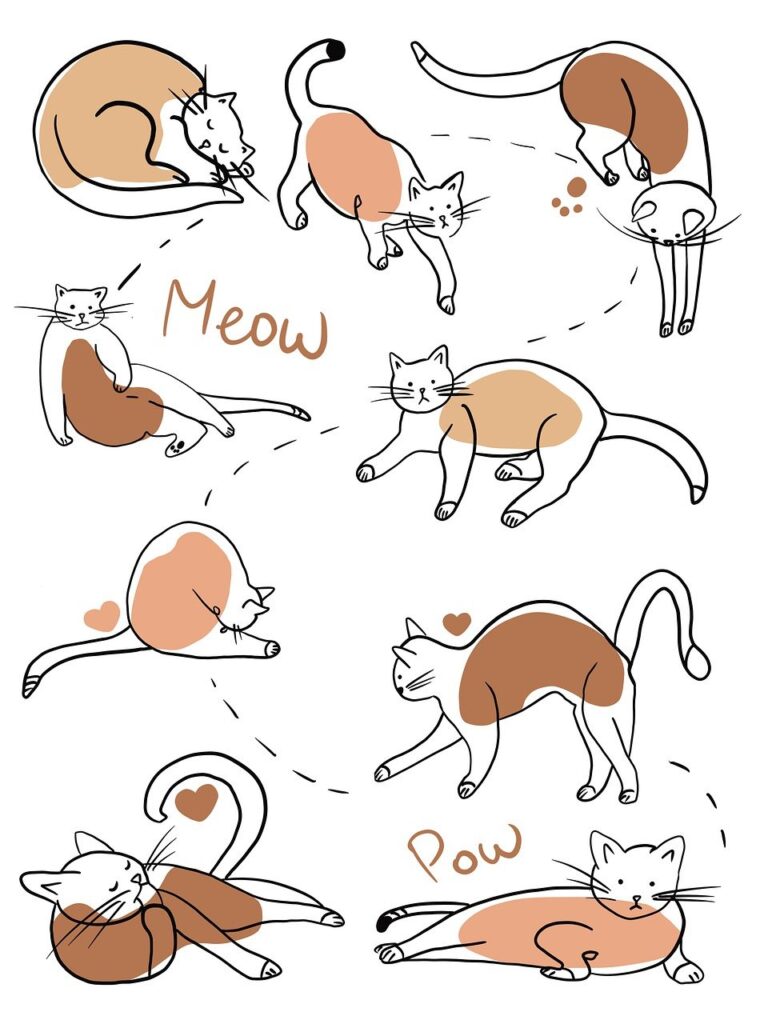
Other Plants Harmful to Cats
List of Poisonous Plants for Cats
While poinsettias may not pose a significant threat to cats, there are other plants that are indeed toxic and should be kept out of their reach. It is important for cat owners to be aware of these plants to ensure the safety of their feline companions. Some common toxic plants for cats include:
- Lily (Lilium spp.)
- Sago Palm (Cycas revoluta)
- Aloe Vera (Aloe vera)
- Lily of the Valley (Convallaria majalis)
- Oleander (Nerium oleander)
Symptoms Associated with Each Plant
Each toxic plant presents a unique set of symptoms when ingested by cats. For example, lilies may cause kidney failure, resulting in symptoms such as vomiting, increased urination, and dehydration. Sago palms can lead to liver failure and exhibit symptoms like vomiting, abdominal pain, and jaundice. It is vital to familiarize yourself with the symptoms associated with toxic plants to recognize any potential poisoning incidents promptly.
How to Prevent Cat Exposure to These Plants
To prevent cat exposure to toxic plants, it is crucial to take the following precautions:
- Remove toxic plants from your home or place them in areas where cats cannot access them.
- Educate yourself on the plants that are hazardous to cats and be vigilant when purchasing new plants.
- Consider creating a dedicated indoor or outdoor cat-friendly garden with non-toxic plants to provide a safe environment for your feline friend.
- Train your cat to avoid certain plants by using positive reinforcement techniques, as mentioned earlier.
Non-Toxic Plants for Cats
List of Non-Toxic Plants for Cats
If you want to create a safe and cat-friendly environment in your home, consider introducing non-toxic plants that can bring beauty and health benefits to your cats. Some examples of non-toxic plants for cats include:
- Catnip (Nepeta cataria)
- Spider Plant (Chlorophytum comosum)
- Boston Fern (Nephrolepis exaltata)
- Orchids (Orchidaceae family)
- African Daisy (Arctotis stoechadifolia)
Benefits of These Plants for Cats
In addition to being non-toxic, these plants offer various benefits for cats. Catnip, for example, can stimulate playfulness and provide mental stimulation for cats. Spider plants are safe and can improve air quality by removing harmful toxins. Boston ferns act as natural humidifiers, contributing to a healthy indoor environment. Orchids and African daisies can enhance the aesthetics of your home while posing no threat to your furry friends.
Where to Purchase Non-Toxic Plants
Non-toxic plants for cats can be found at garden centers, nurseries, or even online. When purchasing plants, consider seeking advice from knowledgeable professionals who can guide you towards cat-safe options. Additionally, many reputable online plant retailers provide detailed information about the toxicity levels of the plants they sell, allowing you to make informed choices when selecting new additions to your home.
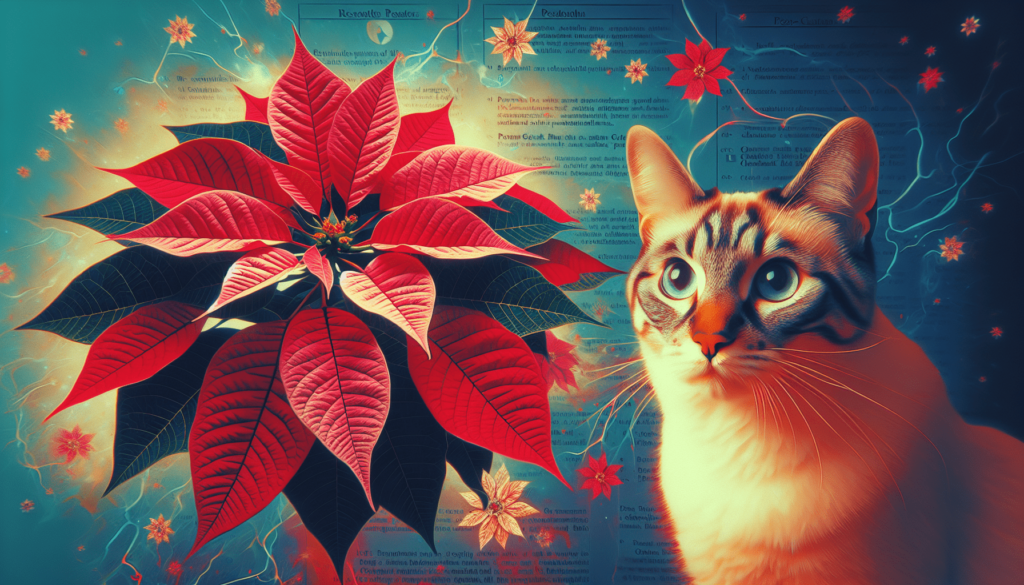
Educate Others About Poinsettias and Cats
Importance of Spreading Correct Information
In the age of information, it is essential to spread accurate and reliable information regarding poinsettias and their potential toxicity to cats. Educating others about the truth behind the myths ensures that cat owners can make informed decisions regarding the presence of poinsettias in their homes. Dispelling these misconceptions and promoting factual knowledge helps alleviate unnecessary fear and worry during the holiday season.
Ways to Educate Other Cat Owners
As a responsible cat owner, there are various ways to educate other cat owners about poinsettias and their actual toxicity. Consider the following methods:
-
Share accurate information: Utilize social media platforms, blogs, or local community groups to share articles or informative posts about poinsettias and their safety for cats.
-
Discuss with fellow cat owners: Engage in conversations with other cat owners, whether at local cat clubs, parks, or online forums, to provide firsthand knowledge and experiences debunking the poinsettia myth.
-
Distribute informational materials: Create or distribute informative flyers or brochures at local veterinarian clinics, pet stores, or animal shelters to reach a wider audience.
Impact of Education on Cat Health
By actively spreading correct information about poinsettias and cats, you can positively impact cat health and well-being. Misconceptions can lead to unnecessary stress and anxiety for cat owners, often resulting in the avoidance of beautiful holiday plants such as poinsettias. Through education, cat owners can confidently appreciate the festive beauty of poinsettias, knowing that their beloved feline companions are not in danger.
Summing Up Poinsettias and Cats
Recap of Poinsettia Toxicity
Poinsettias have been wrongly accused of being toxic and deadly to cats. However, scientific research has disproven these claims, demonstrating that poinsettias are relatively safe for cats to be around. While mild gastrointestinal symptoms may occur if ingested, severe poisoning or fatal outcomes are extremely rare. It is crucial to rely on accurate information and separate fact from fiction concerning poinsettias and cat safety.
Importance of Prevention
Although poinsettias are not highly toxic to cats, prevention is still important when it comes to the well-being of our feline companions. Taking proactive measures to ensure poinsettias are kept out of a cat’s reach can help prevent any potential discomfort or illness. By implementing preventative strategies, cat owners can create a safe environment for their furry friends during the holiday season and beyond.
Emphasize Cat Owner Responsibility
As cat owners, it is our responsibility to educate ourselves and others about potential dangers, as well as to take appropriate actions to protect our cats. By understanding the facts and debunking myths, we can make informed decisions for the well-being of our feline companions. Let us embrace the joy and festive spirit of the holiday season, knowing that our cats can safely share in the celebrations with us.
